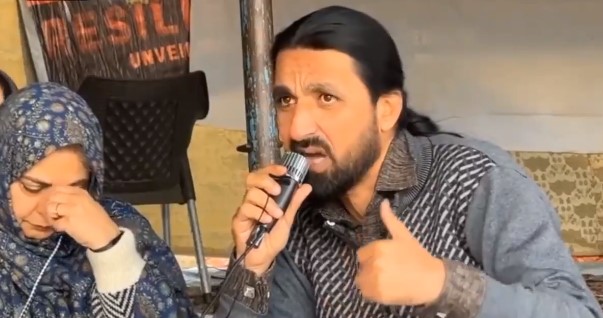In the midst of ongoing protests against the extrajudicial killing of Baloch youth and a march condemning the Baloch genocide, the Baloch Solidarity Committee (BYC) recently convened a conference in Islamabad. Zubair Shah Agha, a central committee member of the Pashtun Tahaffuz Movement (PTM), delivered a fiery speech condemning the Pakistani establishment’s stance on key figures and expressing concerns over the human toll of the so-called “war on terror.”
Addressing a rally session, Agha sarcastically remarked on the Pakistani establishment’s labelling of various figures as traitors, including Bacha Khan, Manzoor Pashteen, Ali Wazir, Mehmood Khan, Samad Khan Achakzai, Akhtar Mengal, Attaullah Mengal, Mahrang Baloch, and Sammi Deen Baloch. He humorously added, “I think Mama Qadeer Baloch has been a traitor for at least 15 years,” highlighting the establishment’s tendency to dismiss dissenting voices.
Agha criticized the Pakistani establishment, asserting that it operates with a mindset dominated by generals adorned with stars on their shoulders. He argued that any dissenting voice is swiftly labeled as anti-constitutional and traitorous, emphasizing the absence of a true constitutional framework in the country.
BYC Conference: Agha speaks with facts
Agha asserted that Pakistan’s economy intricately ties itself to the “war on terror,” relying notably on external aid. He accused both terrorists and the Pakistan Army of contributing to the massacre of Pashtuns. Agha challenged official figures, claiming that the actual number of Pashtuns who have lost their lives in the conflict surpasses the reported 80,000 and could exceed one lakh.
Moreover, Agha raised concerns over the disappearance of 20,000 youth, with PTM confirming 8,000 cases. He questioned the whereabouts of these missing individuals, citing instances where construction activities revealed the remains of young people beneath the ground. Agha expressed skepticism about the establishment’s commitment to resolving these issues, accusing them of prioritizing violence to maintain their financial interests.
In conclusion, Agha highlighted the economic underpinnings of the ongoing conflict, stating that if the “war on terror” were to end, those in power would struggle to maintain their luxurious lifestyles abroad due to a lack of financial support. The Baloch Solidarity Committee’s conference in Islamabad sought to shed light on these pressing issues and call for justice and accountability in the face of alleged human rights violations.

